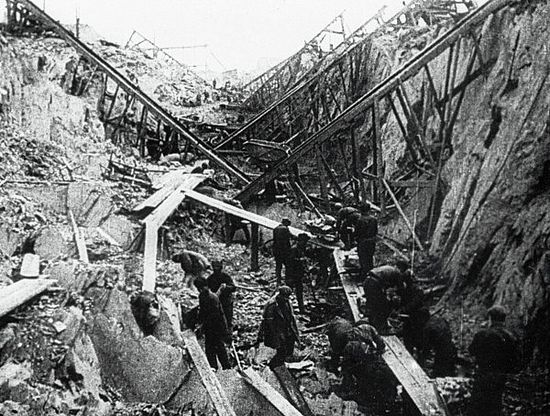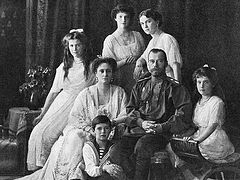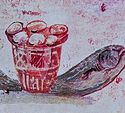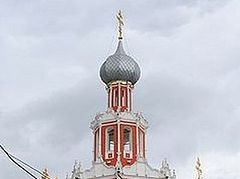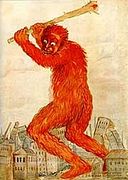On November 6, 1917 (October 25 according to the Gregorian calendar used at the time) the “Great October Revolution” began in Russia, changing that country forever. The aristocratic family of Prince Zurab Chavchavadze, a direct descendant of Georgia’s beloved and sainted poet, Ilia Chavchavadze, fled after the Bolshevik Revolution. Enticed back by Stalin’s government, Zurab’s family left Paris for the Soviet Union only to find themselves in prison and exile.
Pravoslavie.ru correspondent Peter Davydov spoke with Prince Zurab about whether the tragedy of Russia in the twentieth century was accidental, or came about through specific causes. Was the Soviet period of Russian history no more than a terrible a curse or do we need to try to find something positive? And how can Russia prevent similar suffering in the future?
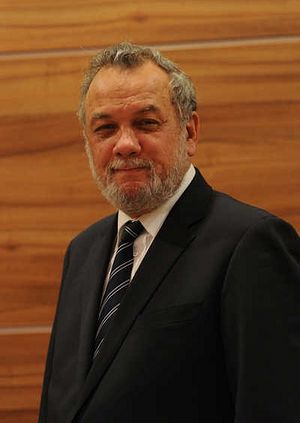 Zurab Chavchavadze. —Zurab Mikhailovich, was the year 1917 a total tragedy for Russia? Or perhaps it freed the country from an unviable social order with all it defects? Could these events have been a sort of “surgical operation” to remove a “cancerous tumor”?
Zurab Chavchavadze. —Zurab Mikhailovich, was the year 1917 a total tragedy for Russia? Or perhaps it freed the country from an unviable social order with all it defects? Could these events have been a sort of “surgical operation” to remove a “cancerous tumor”?
—From the spiritual point of view, the events of 1917 were a large-scale catastrophe not only for Russia but for Christianity all over the world. That is because from the time of the fall of the Byzantium up until the destruction of the Russian Empire, our country was the only sovereignty left in the world whose national ideals were steadfastly founded on Christian teaching. In Sergei Uvarov’s famous “Triad of Official Nationality”—“Orthodoxy, Autocracy, and Nationality”, Orthodoxy was not only placed intentionally at the beginning, but the other two were also penetrated with Orthodox content. After all, the condition for autocracy here was that its authority was divinely bestowed upon God’s Anointed One, and nationality is understood as the conciliar unification of the people who formed the state, who are responsible before God for the establishment of home that encompassed all nationalities based on the Christian principles of justice and mercy.
In losing its status as a worldwide bastion of Christianity, Russia lost its apocalyptic function as “the one that restraineth”, thus loosing the hands of apostate powers and condemning the peoples of the world to untold sufferings during the course of the twentieth century, and continuing on to this day to sow everywhere enmity, division, and spiritual and moral corruption.
The thesis that the Russian Revolution perhaps “freed the country from an unviable social order with all it defects” reminds me of the joke about the guillotine being an effective cure for a headache. Personally, I could hardly call the social order that provided Russia with an unprecedented upward surge during the reign of Nicholas II “unviable”. And as for “removing the defects”, the great Stolypin commented well on this when he foresaw countrywide prosperity in Russia under the condition that it have twenty years of peace. It’s understood that such prosperity also included the removal of defects.
And of course, about the revolution as a surgical operation to remove a “cancerous tumor”: This comparison is justifiable only if you allow that the surgeon was not a healing doctor but a monstrous, mad scientist who instead of removing the “cancerous tumor” took all the healthy, vital organs out of the organism. This is what happened with the highly unique Russian gene pool, which found itself on the verge of total extinction after the Bolshevik “operation” of physically exterminating or forcing into flight from the country all the best representatives of all social classes—the industrious peasant, the educated aristocracy, the enlightened clergy, the enterprising merchants, the freedom-loving Cossacks, and the parliamentary[1], creative, and scholarly intelligentsia.
—If this was a catastrophe, and a tragedy, then is it one that came on suddenly, unnoticed, and unexpectedly? Were the God-bearing people just living their lives when suddenly catastrophe befell them? Could there be some parallel here with the Old Testament history, or with Byzantium or Christian Rome?
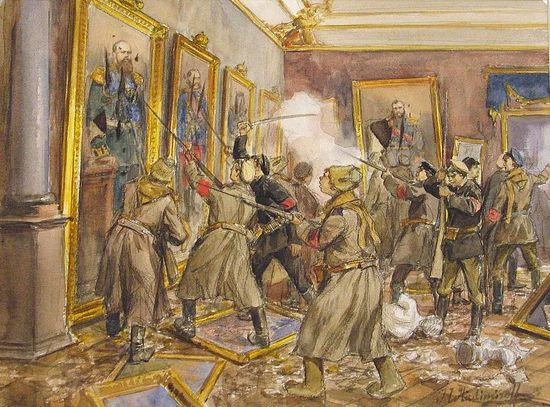 Ivan Alekseyevich Vladimirov. Revolution (drawings from an album). 1917-1918. Paper, water color.
Ivan Alekseyevich Vladimirov. Revolution (drawings from an album). 1917-1918. Paper, water color.
—The catastrophe did, of course, hit the people—only not from the outside, but from within. The people as a whole, beginning from the top, to the middle classes, and finally to the broad masses of peasants had begun to gradually depart from the traditional foundations of life that had for centuries been very closely bound up with Church institutions, which required all to test their deeds against the eternal, faith-based principles. That is why we not only can but must draw parallels with Old Testament and Christian eras in order to suggest to our social consciousness the thought that any mass apostasy from divine commandments inescapably leads to tragic events in the life of God’s people.
Nevertheless, these catastrophes came “unnoticeably, unexpectedly” only for those who had stopped learning from history. This moment is artfully investigated in the film by Nikita Mikhailkov, “Sunstroke”. We recall the radiant little boy who after falling for the temptation of the revolutionary spirit changes from an angelic being into a notorious killer. This tragedy of one individual becomes the prototype of the gigantic tragedy of an entire people. And the main thing here as far as cause and effect goes is that both tragedies were predetermined by apostasy. For the former seminarian as well as for many of those in the “creative” caste and spiritually bankrupt members of the intelligentsia, the tragic events in Russia really did come on unnoticeably.
But there were other Russian people who had not broken from a life in Christ. They tirelessly called the people to come to their senses and warned them about God’s inescapable punishment for apostasy.
—St. Theophan the Recluse wrote at the end of the nineteenth century, “Do you know what bleak thoughts I have? And they are not unfounded. I meet people who are numbered among the Orthodox, who in spirit are Voltairians, naturalists, Lutherans, and all manner of free-thinkers. They have studied all the sciences in our institutions of higher education. They are not stupid nor are they evil, but with respect to the Church they are good for nothing. Their fathers and mothers were pious; the ruin came in during the period of their education outside of the family homes. Their memories of childhood and their parents’ spirit keeps them within certain bounds. But what will their own children be like? What will restrain them within the needed bounds? I draw the conclusion from this that in one or two generations our Orthodoxy will dry up.” St. John of Kronstadt and St. Ignatius (Brianchininov) as well as the great Russian writers also shouted about the coming catastrophe. What, in your view, caused their alarm, their presentiment of the coming catastrophe? After all, Rus’, Russia can probably serve as a worthy example of courageous and Christian endurance of all kinds of material hardships. What caused our saints to speak with such sorrow about the coming times?
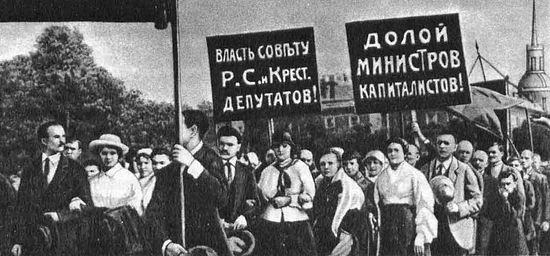 A demonstration in Petrograd. June 18, 1917.
A demonstration in Petrograd. June 18, 1917.
—Those are the very Russian saints I meant when I spoke about those who were alarmed over the fate of Russian Orthodoxy. I would also add the Optina Elders, and the majority of our famous Slavophiles. Their alarm was based precisely on the ability to draw lessons from bitter historical examples of both Old Testament and Christian periods, including those sad pages of our history that are connected with internecine wars between Russian princes and the Time of Troubles. We have to admit, albeit with great regret, that the larger part of Russian prerevolutionary society did not listen to the alarming warnings of our spiritual giants, which only goes once again to show the truth of the famous maxim, “A prophet is not known in his own country.”
I can’t but agree that truly, Russia has many times been an example of steadfast Christian carrying of a heavy cross, when it was beset with all kinds of material adversities and hardships. But this fact could in no way ease the alarm of our saints, who sorrowfully foretold the coming times. This is because they sorrowed and were alarmed not over defects in the Russian character, such as, let’s say, faint-heartedness, weak will, or cowardice, but over the people’s faithfulness to Christ and His teaching. It is in this that they saw the Russian Orthodox person’s main calling. And the disregard for this calling increasing with each generation made them sorrow over what was to come.
Incidentally, the same concern with preserving faithfulness to Christ’s teaching can be heard from some who are practically our contemporaries—the Holy New Martyrs and Confessors of Russia. In their instructions to their flocks and in letters to spiritual children from prison they constantly called on people to strengthen their faith; they taught them not to seek other reasons for the reign of godlessness other than the drying up of Orthodoxy in Rus’, and like St. Seraphim of Sarov they spoke of the importance of acquiring a “spirit of peace” as a surety not only of our personal salvation, but also of the restoration of our Orthodox fatherland to the path of spiritual rebirth.
—In Soviet times the country achieved many things, beginning with the spread of electricity to homes and buildings (gas pipes to homes, it’s true, lag behind) and ending with space exploration and everything else. We can be proud of all this. Could it be that these achievements were made possible by the Soviet government? Sure, it cost many lives as they say, but perhaps these sacrifices were justified?
—No matter what we think of the Soviet regime it is hard not to recognize the objective successes that it managed to achieve. Those who are fixed on hatred for that regime often say that those successes weren’t at all achieved thanks to the Soviet regime but in spite of it, meaning that the people’s talents, will, industriousness and enthusiasm did the job despite the helpless government authorities. Nevertheless, it is hard to imagine how we could have completed the daunting task of the “State Commission for Electrification of Russia”, or, let’s say, atomic and space programs, without the participation of government authorities.
In my opinion, we need to talk not about the Soviet government’s lack of achievements, which were undoubtedly demonstrated, but about what achievements Russia might have made by, say, 1930, if the revolution had never happened in 1917; meaning: a) If Russian had won World War I; b) If it had not had the civil war, revolutionary terror, the departure and death of precious human resources, hunger, destruction, loss of Church and museum artistic valuables, and so on; and c) if a victorious spirit had overtaken the entire nation and inspired it towards a postwar restoration of the economy!
I can imagine that regardless of the differing opinions about history not having a subjunctive tense, it is perfectly appropriate to frame the question this way. From this very perspective it becomes clear how absurd it is to idealize the Soviet regime and tell sentimental tales about how “Stalin received Russia with the plow, and gave it back with the atomic bomb.” No revolutionary shifts are capable of providing prosperity and well-being; they are everywhere destructive and always throw the country backwards by all parameters of state existence.
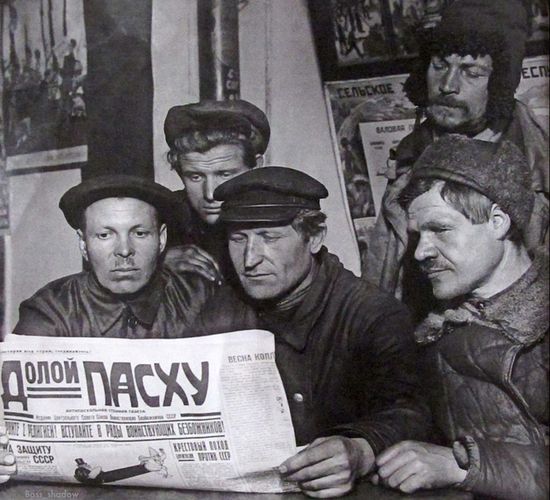 Reading the paper, "Down with Pascha (Easter)".
Reading the paper, "Down with Pascha (Easter)".
For me personally, a negative relationship toward the Soviet regime, with all recognition for its objective achievements, is determined by the fact that it continued the anti-national line of the revolution for destroying the fundamental values of historical Russia and liquidating its Orthodox foundation and origins.
As for “justification of the many sacrifices”, I will cite the profound thought of Feodor Mikhailovich [Dostoevsky] about how no beneficent aims, no matter how great, can justify the tear of even one infant. I would propose to speak not of justified sacrifices but rather about their spiritual significance in the rebirth of faith in Russia, which is now happeneing both mysteriously and obviously. Let us bow down in gratitude for their sacrificial labor and their prayers!
—We are talking on the eve of the Russian day of peacemaking and unity. As a person who has been directly touched by the consequences of the October revolution, could you say that there really is peacemaking and unity in our society? Are we worried about Russia’s future? Aren’t we witnessing the symptoms of society’s spiritual illness, and aren’t they just too much like those on the eve of 1917?
—Alas, I can’t give a positive answer regarding any peace and agreement reigning in our society. But neither can I pass over the positive steps in this direction. Remember the terrible 1990s. Totalitarian liberalization of social moods, the cult of Western lifestyle taken to absurd extremes, the relegation of lofty patriotic feelings to the level of the “last refuge for scroundrels,” the defamation of a man in military uniform, the idealization of the “Pepsi generation”, the unbridled propaganda of violence and debauchery… What optimistic dreamer could have imagined that only ten years later the overwhelming majority (over 80%) of this same society would choose as their national leader a man who publicly and systematically overthrows all these hideous anti-Russian and anti-Orthodox pseudo values?
Even so, you are right concerning the presence of anxiety over Russia’s future. The spiritual state of today’s society really does remind one of the situation on the eve of 1917. But two circumstances are consoling. Firstly, the inarguable fact that the home-grown wretched liberals, who greedily relished their power in the 1990s, have summarily and enduringly discredited the liberal idea in the minds and hearts of our contemporaries. And secondly, there is the factor of a progressively growing number of young people filling Orthodox churches all across greater Rus’. These two circumstances distinguish in principle the prerevolutionary situation from the current one. They are, as I see it, the primary reason for the crushing defeat of the “white tape” fifth column: everyone is utterly tired of liberal slogans, and the greater mass of young people refused to participate in the “Bolotny” movement.[2]
—In your opinion: Could a possible catastrophe be avoided? What can we do in order to prevent one?
—We are commanded not to be despondent and to live according to the principle of “do as a Christian should, and what will be will be.” Will the Lord will allow a catastrophe to break over the Russian land if there will be, as in better, former times, righteous people? In my opinion this is a rhetorical question. And righteous ones are not only those who leave the world to labor ascetically in prayer as recluses. They are also those who live actively in the world as conscientious workers, raising and educating their children, protecting their fatherland, researching the mysteries of the world’s creation, creating works of art that ennoble souls, mining natural resources; that is, people with the most ordinary professions but living with Christ, avoiding sin and keeping Christ’s main commandment of Love for God and neighbor. Glory be to God, there are many thousands of such people all across our country. This kind of cooperation of Russian people with God’s plan for the created world is the foundation of our hope in prosperous times and the triumph of Christian truths.

